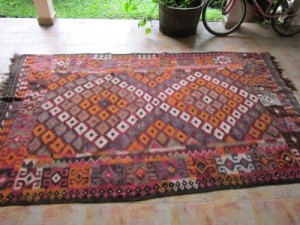I have an old kilim that I bought at the flea market. I wonder how to clean it. I'm afraid of the colors running or that it may shrink.
Any ideas?
Add your voice! Click below to answer. ThriftyFun is powered by your wisdom!
If you read down a couple paragraphs you will find some good information here:
www.kilim.com/
I've had my Turkish rug for years and have always scrubbed it with a solution of white vinegar and water, half and half, then I put it over a clothes horse and hose it down, then leave it to dry for about a week before storing away.
Mine is basically beige and cream so I can't guarantee colors running or not.
Add your voice! Click below to answer. ThriftyFun is powered by your wisdom!
I bought an old Turkish kilim rug with mold and fabric damage. Can I save it?
By dandk
Our situation was this: We needed a rug for utility purposes at our home in Central America. We were given a old (100 years+) 12x6 kilim I assume is Turkish. It had been stored for years folded up in a dark humid room and was in terrible condition, including a lot of mold and fabric damage.
We decided to "restore" it only with the idea of being able to have it in the house, not with the idea of retaining monetary value. First we washed it with a cold water rinse (garden hose), then sun dried it for a few days, off the ground, rotating the sides.
Once relatively dry, we made a diluted solution of liquid (color safe) fabric cleaner and water. My wife and I lightly scrubbed both sides of the rug from end to end using a common bristled brush. We hosed it off thoroughly to get the soap out.
Finally I made a half water, half white vinegar solution and applied it lightly but evenly to one side using a broom, then allowed it to dry. The next day, repeated on the other side. It was completely dry in a couple days.
It turned out very well. The mold is gone, the wool clean, the colors shiny. There is a slight odor of wool and vinegar, but experience has proven that some smells are inherent to authentic rug and kilims.
There is evidence of the bright reds running into adjacent whites. This is not desirable, but within our own threshold of acceptability. I can't even say for sure that the running wasn't present before we started. I know this method is harsh and would not be suitable for collectable, valuable, fragile pieces.
I just wanted to share a fast, economical solution that saved a nice kilim from the trash. I personally believe that the vast majority of these rugs are designed and crafted to be used and appreciated everyday, and therein lies the real value. Hope this helps someone.
